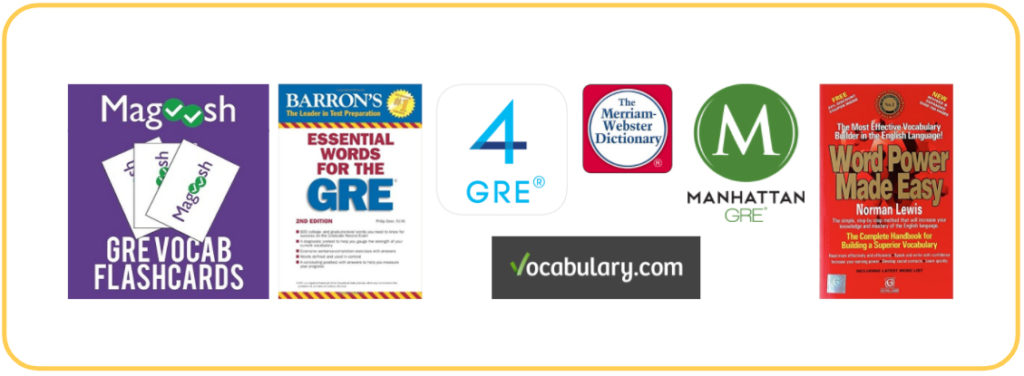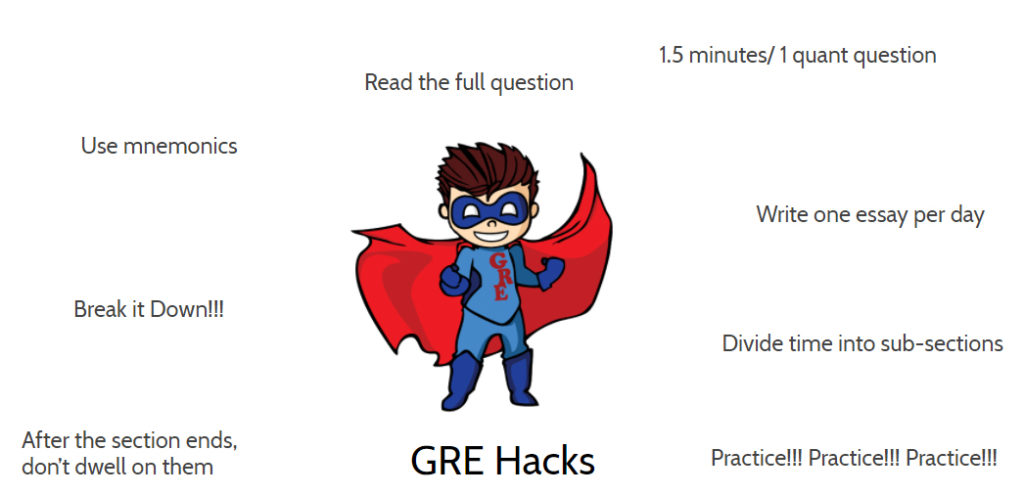For anyone who dreams of acquiring a Masters degree or a Ph.D. in the United States, one of the biggest hurdles is the GRE exam – it stands for Graduate Record Examinations, and is the “one test for graduate and business school,” according to the ETS, who are the people who actually make the test.
The test measures your English fluency in analytical writing, vocabulary and comprehension as well as your grasp of basic mathematics. There is no calculus – in case you were wondering. Now that I have gone through the arduous process, let me share some steps I took as well as some tips and hacks that could help.
Getting Started: The First Few Steps
Step 1: Figure out your score requirement
The GRE score you require will depend on the program and college you are applying to. Typically, a score above 315 is considered good and above 325 is considered excellent. However, there are some colleges who regard GRE scores merely as a fringe requirement, giving more weight to your GPA and other qualities like research experience. In general, higher ranking universities like the Ivy League universities require a significantly higher score.
Additionally, as GRE has 3 sections i.e. Verbal, Quant and AWA, universities might care more about your score on some sections more than others. AWA and Verbal sections measure your English proficiency, with AWA focused on your writing and the Verbal on your reading skills, with both also measuring your analytical skills. And finally – the Quant section measures your mathematical skills. If you are applying for a technical field like engineering, your Quant score might be the most important. In this scenario, a score of 167 in Quant and 150 in Verbal may land in you in a good university, while a score of 160 in Quant and 157 in Verbal – although aggregating to the same total of 317 – may not get you there.
A typical good AWA score is 4 or higher but this too depends on your target college and program. If you aim to get a R.A. (Research Assistantship), you will need more than 5.
It is best to first figure out what your score should look like when you apply for your desired program, and use that to structure your preparation. Of course, the higher you score the better your chances of getting into your choice of program will be.
Step 2: Figure out how much preparation time you need
Do not register for an exam date right away. The smarter thing to do will be to gauge your learning speed pertaining to the GRE exam. Observe your progress in the first two weeks or so. After perusing the syllabus, you should be able to easily figure out the best time to take the exam. After that, you can follow the instructions given in the “Registering the dates” section of this article.
There are multifarious variables that affect the preparation time you will need: the depth of your initial skills, how quickly you can learn and finally, your dedication. You should also consider the application deadlines of your targeted colleges, and your score requirements. Tailor a plan for study accordingly.
Step 3: Start a GRE study schedule
Creating and keeping up with a pragmatic schedule with specific tasks to complete every day is the best way to study. This is because deadline is the greatest inspiration, for me at least.
As mentioned earlier, the GRE exam has 3 sections which will measure your analytical, language and quantitative skills. However, the Quant section will also require competence in English because of two reasons. First of all, the questions will be in English. More importantly, many of the questions will be convoluted while their mathematical solution will be relatively easy, so the ability to solve such questions will depend on how well you untangle the question.
You can start by reading the official comprehensive GRE guide which is made by ETS, and covers both the Quant and Verbal sections. There are also 2 official and pretty accurate mock tests provided freely by ETS known as PowerPrep 2 (version 2). The first test is relatively easy and the second one is significantly tougher. In general, your score will lie between these 2 test scores. It would be wise to take these 2 tests 10 days before the actual exam with an interval of 3 days or more in between the 2 tests. Although, you can also take it earlier to understand the structure of the exam and where you stand in terms of your current skills.
I started my GRE preparation by joining an institute in Kathmandu three months before my test date, and took the GRE test on March 13 at USEF Nepal. The institute classes were 4 days a week for 10 weeks. During those 10 weeks I just completed the assigned work, which wasn’t much. After the 10 weeks, I had gathered all the know-how of the GRE exam and what was left to do was practice.
I studied vocabulary and maths on alternate days. Each study session started at 9 in the morning and ended an hour or two before I went to bed at around 10 pm. But, I did take breaks in between, which lasted any time between half an hour to half a day; but mostly it was half an hour after 2 hours of studying. I also had a break day where I would go out and enjoy life, or what little of it I had left after slowly being devoured by the GRE exam.
I mostly studied Magoosh flashcards and mastered all 20 decks; with an average of 50 words per deck, so about 1000 words. I then studied a vocabulary list provided by my institute which consisted of about 1800 words in total, although I had already mastered some of them from Magoosh. I also read various articles from sources such as IFLscience in facebook and noted the words there. And, I watched One Piece anime at times for the sake of “education” and they have some well-written subtitles: one episode would contain 4-5 GRE words and I would be delighted if I had already mastered them. I didn’t understand all the words that appeared on the GRE exam, but was able to use the elimination method to arrive at the answer. Many say Barron’s vocabulary list is better and more comprehensive with more pertinent words.
To prepare for the Verbal section, I used 3 sources. The primary source was the Official GRE guide and the Official Verbal Reasoning guide of ETS. The second source was the 2 books my institute provided, although I didn’t complete all the questions there. The third source was the Ready4Gre app which I have described in another section of this article.
For my Maths practice, I primarily practiced questions from the 2 books provided by my institute. I (obviously) also practiced all the questions from the Official Guide to GRE by ETS. I also practiced occasionally from the Ready4Gre app.
About 2 months before the GRE exam, I started taking mock tests. They were provided online by the institute as well as from various renowned sources online. I also took the two PowerPrep 2 exams about seven days or more before the actual exam and got a score of 330 and 326 respectively.
I do regret neglecting the AWA practice because didn’t manage time to write a strong essay. However, I still remained calm throughout the exam, which is the key to getting great marks. All your preparation will be in vain if you perform poorly in the exam just because you were nervous.
Step 4: Register for the test
To register for the GRE exam, you will need to create a GRE account in the official ETS website, which is free of cost, and then select an appropriate exam center, test date, and time. After this, you will need to pay $205 to register for the GRE exam. Those without a credit card can go to local banks that will pay your registration fee for a small commission, usually Rs. 500 along with $205 converted to Nepalese currency. When I registered, the Nabil Bank branch at Durbar Marg was the only one that provided this service. Expect a queue, as those taking TOEFL or SAT will also be in line for this service.
For your test location, it is a good idea to choose the Fulbright Nepal (United States Education Foundation) office located at Gyaneshwor because it is well managed, so the exam will be fair. Also, they are strict about enforcing silence so it will be a noise free environment. That doesn’t ensure you will be calm, but it definitely doesn’t hurt.

GRE Preparation Resources
Below are some online and offline resources that were crucial to my GRE preparation
This should be your first stop, and is also where you create your GRE account and register for the tests. They also provide some handy tutorials as well as practice questions.
To prepare for the AWA section, the links to the Issue Pool and Argument Pool are worth bookmarking, as the issue and arguments topic on the GRE will be exclusively from this pool. It’s a good idea to cover all topics and prepare points for them – if not practice them one by one. Writing one essay per day on a topic picked from here would be extremely useful.
I strongly recommend using Magoosh Flashcards from the beginning of your study; I used them extensively. They contain GRE words categorized in groups and sections by difficulty; although even the words in the beginner section can prove difficult at first.
This is another free online resource to help you enhance your vocabulary, where you guess a word from pictures and clues. I, unfortunately, was not informed about this while studying for the GRE, but now you are, thanks to the recommendation from some of my friends who used it.
There are also practice tests you can take online or download from Kaplan, Barron’s and Manhattan.
There are also a handful of official GRE books. I recommend using these two:
- Official Guide to GRE
It contains details related to both Verbal and Quant sections including how to solve every type of questions, techniques and information related to the exam as well. It also contains real responses or answers to some AWA questions and their respective graded marks giving you a basic idea of what your essay should be like. - GRE Verbal Reasoning Guide
It is focused on the verbal section of the GRE, and will contain the questions in the Official Guide, as well as extra verbal questions.
Here are a few resources that could supplement these books:
- Manhattan provides various preparation books for both Quant and Verbal section. I read only 4-5 pages of their Verbal guide but it was pretty good. I ended up using the books from my institute instead, but I highly recommend referring to these books.
- Ready4Gre (Prep4Gre) is a great app which consists of vocabulary sections, break-down of theories and even information regarding colleges and universities in US. So, this a must-have app but how much you explore it will depend on you. One of the great features about the app, which I myself used, was the “question of the day” where you would get a question every morning from either Verbal or Quant section.
- Word Power Made Easy, a vocabulary building hack book written by Norman Lewis gives you new methods to remember words by breaking them into their components. I didn’t use it but it sounds like a good way to build your vocabulary.
- Merriam-Webster dictionary app is also a great resource because it too gives you the root of words. You could use it as a general dictionary for learning the meaning of new words you encounter in your study.

The Hack
Here are some test preparation and test-taking hacks that I found helpful:
During Preparation
- Use mnemonics to remember words: You can remember words by breaking them down and/or linking them to objects. For example, you can remember the meaning of consternation by breaking it into CONStant TERror NATion, a nation where “feelings of anxiety or dismay, typically at something unexpected” may occur. You can also use your past experiences to remember the words. Playing skyrim or watching anime might actually come in handy here.
- Write at least one essay per day. The essay in the GRE is different from a normal essay, and it is a good idea to choose either an Argument or Issue topic from the AWA pool in the official GRE website, and write an essay per day. Tackle a wide variety of topics and you will be prepared for anything that pops up on the test.
- Practice. Practice. Practice. Especially for the Quant section, the best way to sharpen your skill is to practice assiduously. The thing to remember is that the questions are set for minimum use of the calculator provided – so, you have to find that elusive shortcut, and practice gets you there.

During the Test
- LOOK before you LEAP. The shortest way to give a wrong answer to a simple question is by crossing the stupid bridge called OVERLOOKING. Always read the full question, even if you think you already know the answer. The other half of the question may – and usually will – contain a piece of information that might completely change the answer.
- Break it Down, Yo! If you are stuck, break the question down into independent components or sentences and consider them individually. For sentence completion, you don’t need to understand every sentence – and in some questions you actually won’t – as long as you can identify the required word through the tone and context.
- Be Cool. Do not lose your cool. If you get a difficult question, don’t get frustrated, go for the next one. At the end of a section, take a deep breath and remember, the section you did very poorly in might be the extra section. Use this mentality, more than once. Finished a section? Well, forget about it. Trying to figure out what the right answer might have been in question 2 of section 2 will not do you any good in section 3 or 4 or anywhere else. Remember, when section ends, forget about what happened, start afresh with positivity.
- Plan your time. Your worst enemy in the exam – and possibly in your life – will be Time. “Time is of the essence” as they say. Divide your time into what you will do sub-section wise. Here is how I did it: For the Verbal section, I finished all my non-passage questions within 10 minutes and left the remaining 20 minutes for the Reading Comprehension (RC) questions because they needed special attention to understand. For the Quant section, I advise you to practice finishing each question within 1.5 minutes. Some questions will take shorter and some slightly longer, but that should be the sweet average spot. Also, it is better to go through the details or data provided after completely reading the question. For the AWA section, I advise you to come up with the skeleton and the general progression of your essay within the first 5 minutes on the section and write down the main points to include. Finish writing the essay within the next 20 minutes and finally, review your essay in the next 5 minutes.
- Pray to GOD. At least that is what I was doing a few days before and during the GRE exams. It’s not that I didn’t study but still I had constant anxiety where there should have been courage, considering the amount of preparation I had done. While that is to be expected with an exam as important as this, please try to remain calm. Shrug it off if you find a difficult question. Keep moving positively to the next one. I did exactly that and it REALLY helped.
Good Luck!
Disclaimer: Some GRE words have been used throughout this essay to help you jumpstart your preparation. If you stumbled on any of them, that’s your cue to open that dictionary and start learning!

Leave a Reply